Top 6 Ask Viable Alternatives & Competitors
Mar 03, 2026 - 11 minute read
People are now talking, writing, and sharing about everything. Along with this, we have countless data at our disposal. However, the real key is correctly analyzing this data and using the right tools. Especially in the business world, companies must understand the customer journey to establish the right strategies and be more successful than their competitors. But we know that this task is more challenging than it seems. This is precisely where understanding and improving the customer experience comes into play, and I'm here to provide you with great tips and the best customer experience analysis tools!
In this article, I will discuss Viable and its alternatives, making it simple to improve customer experience and implement the right strategies.
If you're ready, let's embark on this enjoyable journey!
In this article, I want to present six alternatives to Ask Viable and discuss four things:
- Features
- Why did I choose these as alternatives to Viable?
- Pros and cons.
- Pricing strategies
If you think it's time to consider the alternatives to Viable, you're on the right track!
Here is the shortlist for curious minds:
Top 6 Viable Alternatives
- Viable vs. Kimola(Start free plan)
- Viable vs. Thematic
- Viable vs. Chattermill
- Viable vs. Medallia
- Viable vs. SentiSum
- Viable vs. Wonderflow
What is Ask Viable?
Viable is an AI-powered analytics tool that helps businesses utilize all their data at scale to make better and faster decisions. It was created with an AI model that generates human-level analyses to help you listen to your target audience, understand their needs, and act faster.
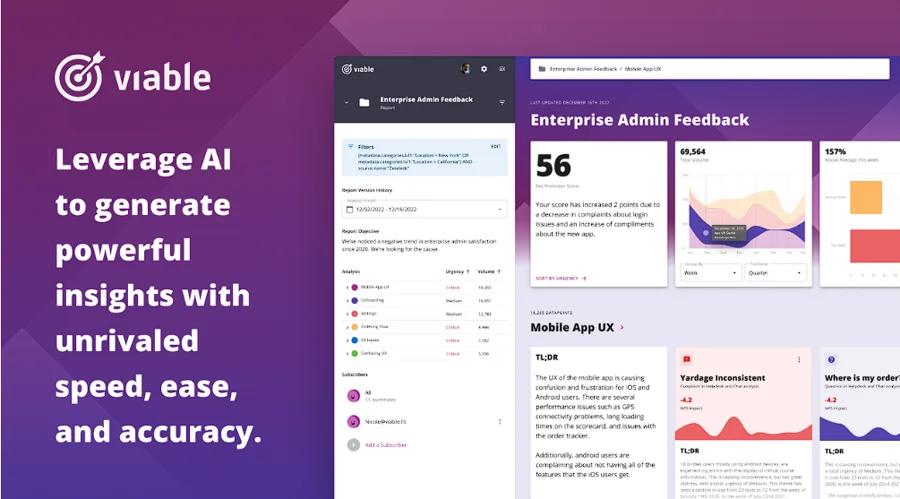
Businesses can streamline their feedback collection, analysis, and sharing processes at scale with Viable. It offers productive analysis with advanced sentiment analysis and topic modeling, providing businesses with a holistic understanding of their customer's experiences and pain points.
However, like the advantages of Viable, there are also disadvantages. Viable may seem expensive for some users. Especially for companies at the beginner level, the price of the startup package being $600 and the growth package being $1000 can be costly.
Users feel that adding more feature functionality to Viable would be ideal. (For example, easier data export, managing/trend reporting over time, etc.). Additionally, users find the reports relatively simplistic, the user interface complex, and information needed to be more easily exportable.
Why do you need a Viable alternative?
- Since Viable is a new company, having more feature functionality would be ideal for users. For example, easier data export, managing/trend reporting over time, etc.
- Viable does not offer table and chart options to users.
- Viable's interface may seem complex to users.
Viable Pricing
- Startup: $600 /month. Up to 2,000 data points*/month
- Growth: $1,000 /month. Up to 5,000 data points*/month
- Enterprise: Custom datapoint* allocation.
1- Viable vs. Kimola
With its superb user interface and Customer Feedback Analysis in over 25 languages, Kimola is a powerhouse. Kimola is a code-free customer feedback analysis tool that collects customer reviews and categorizes them with NLP. Additionally, it can generate robust marketing materials such as executive summaries, SWOT analysis, and TOP product features based on customer reviews, using GPT technology.
With Kimola, you can;
- Scrape reviews using the free browser extension
- Analyze reviews with multi-labels
- Analyze reviews instantly without training
- Create custom models by dragging and dropping and training AI
- Classify and analyze customer feedback using pre-built classifiers (there is a large gallery for each kind of business!)
- Conduct sentiment analysis
- Get NPS Calculation
- Extract popular terms and topics from reviews
- Search through customer reviews
- Create executive summary SWOT analysis, FAQs and other marketing materials based on customer reviews with AI
Compared to Viable, Kimola is a much more experienced company. Kimola offers Customer Feedback Analysis in over 25 languages, while Viable doesn’t provide any information about language support.
Kimola stands out with its user-friendly interface, whereas Viable may seem complex to some users. While Viable may appear expensive for some users, Kimola is more budget-friendly.
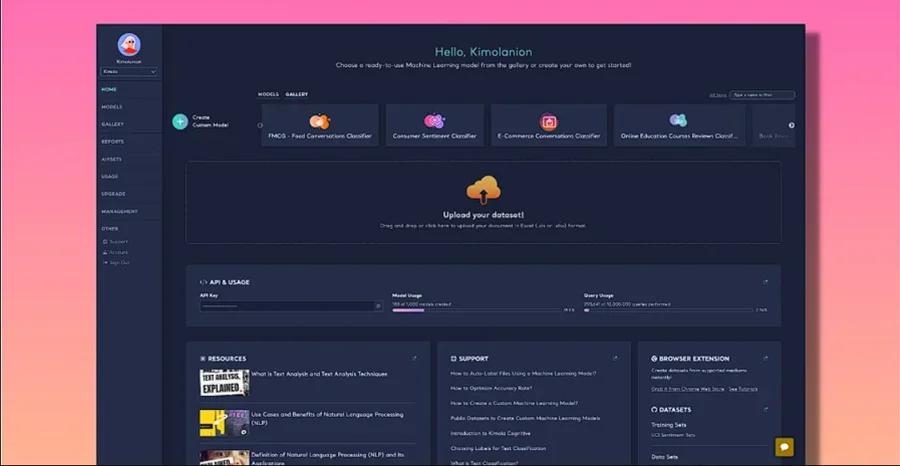
Why should you choose Kimola over Viable?
Kimola is a highly user-friendly tool with a user-friendly interface and explanatory features that stand out. Additionally, this platform has fantastic capabilities, such as analyzing 25+ languages, automatically categorizing structurally meaningful texts, and conducting multi-label classification to obtain comprehensive insights! With dynamic classification technology, you can quickly classify customer reviews, conversational data such as customer-agent conversations, and generate executive summaries with the GPT add-on. It's also an excellent tool for creating marketing materials based on customer reviews such as generating social media content, understanding buyer personas, conducting SWOT analysis, -all done with one click.
Schedule a demo with one of Kimola's experts, or start your free plan to upload your data and see results instantly.
Kimola Pricing
- Free plan (no credit card required)
- Basic plan: $49 / month
- Standard plan: $179 / month,
- Business plan: $359 / month
- Enterprise plans available for Larger Companies
See all plans & features of Kimola.
2- Viable vs. Thematic
Thematic is a company that transforms unstructured feedback data from any channel into insights to improve products and customer experiences.
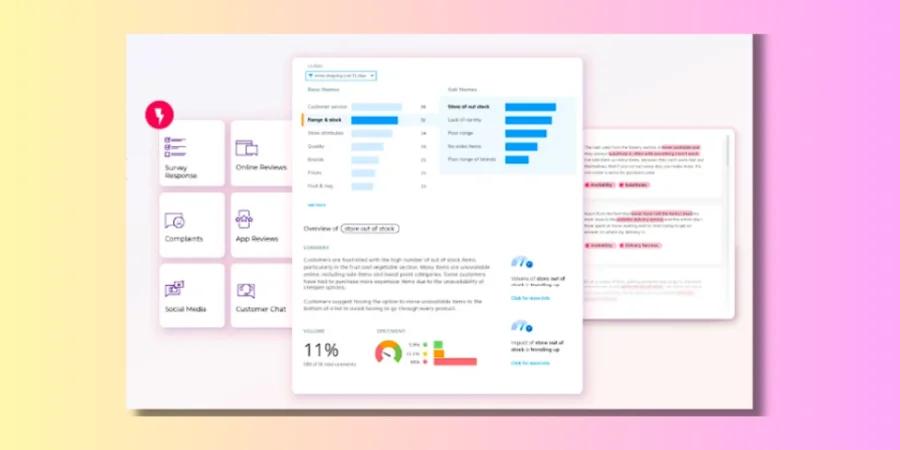
Compared to Viable, Thematic offers a more comprehensive range of visualization and reporting options. Users can create more diverse tables, charts, and customizable reports.
Thematic Reviews
👍 Pros
- Language Support: Thematic offers customer feedback analysis in over 25 languages.
- Variety of Customer Feedback Analysis: Provides analysis options such as emotional analysis, topic and theme modelling.
- Visualization and Reporting: Presents analysis results with various visual graphs and reports.
- Survey Creation: Allows for creating surveys and analyzing the results.
- Integration: Thematic integrates with many platforms, such as Google Sheets, Apple Store, SurveyMonkey, and more.
- Real-Time Analysis: Presents results by analyzing feedback instantly.
👎 Cons
- Thematic may seem expensive for some users.
- Thematic can be challenging for users during the initial setup stage.
- Some users mention that Thematic's customer service is only sometimes fast and effective enough.
- Thematic may create integration difficulties with other platforms in some cases.
- It may require time and effort to change/edit themes.
- Creating main themes is challenging.
Thematic Pricing
- Starter: $2000 per month.
- Enterprise: Custom offers based on the size of the company.
3- Viable vs. Chattermill
Chattermill is a customer feedback analysis tool used to collect, analyze, and understand customer feedback. The aim is for companies to analyze their customer feedback and derive insights from these analyses. Chattermill was founded in 2015 in London, UK.
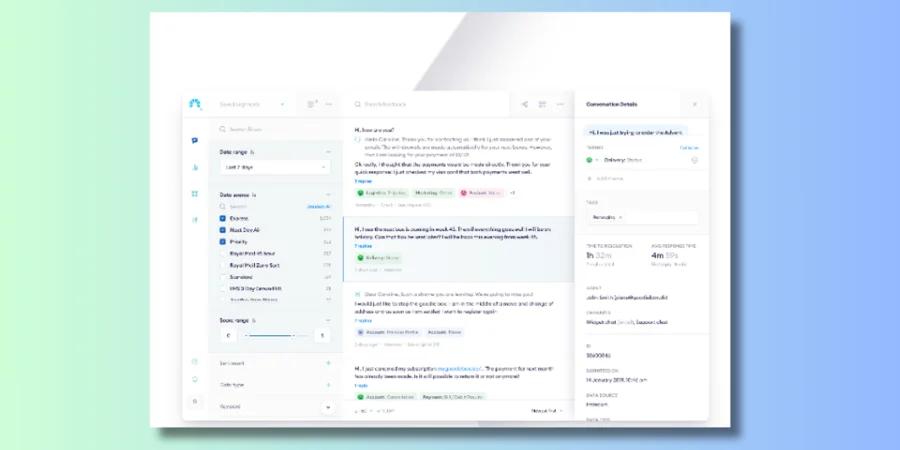
One of Chattermill's best aspects compared to Viable is its ability to examine customers' messages deeply and create specialized reports by analyzing emotional tones.
However, when compared to its competitors, Chattermill has four distinct disadvantages:
- According to users, Chattermill cannot personalize reports.
- There are some integration issues with specific applications.
- Users may find it challenging during the initial setup phase.
- Chattermill is a very expensive option and looks like it’s good for enterprises who need custom models.
- Changing and editing themes in Chattermill can be time-consuming for users.
Chattermill Reviews
👍 Pros
- Emotional Analysis: Allows understanding of customer emotions by analyzing the emotional tones in customer feedback.
- Integration: Integrates with many platforms such as Zendesk, Trustpilot, Qualtrics, Kustomer, and more.
- User-Friendly Interface: Provides an easy-to-use interface for users to navigate the platform comfortably.
- Theme and Topic Modeling: Identify different themes and topics to obtain valuable insights.
- Social Media Analysis: Helps uncover customer issues, new trends, and critical topics discussed on hundreds of web sources and social sites, including Twitter, Pinterest, Reddit, Tumblr, YouTube, and Twitch, with the help of artificial intelligence.
- Automation and Data Analysis for Customer Experience: Saves time with automated reports by eliminating manual analysis.
- Search and Filtering: Allows filtering with tools such as themes and expressions for specific categories.
👎 Cons
- Users find it challenging due to shortcomings in customizing reports.
- Chattermill needs to be translated into more languages for better data acquisition.
- The interface and initial setup phase can be challenging for users.
- It’s an enterprise tool and unfortunately not affordable for most of the companies who need research.
- There are some integration issues with specific applications.
- Changing and editing themes in Chattermill can be time-consuming for users.
- There are no free trials and you can’t try Chattermill with your own data instantly.
Chattermill Pricing
Unfortunately, Chattermill's pricing is not available on their website.
4- Viable vs. Medallia
Medallia is a platform that enables companies to collect, analyze, and gain insights from customer feedback.
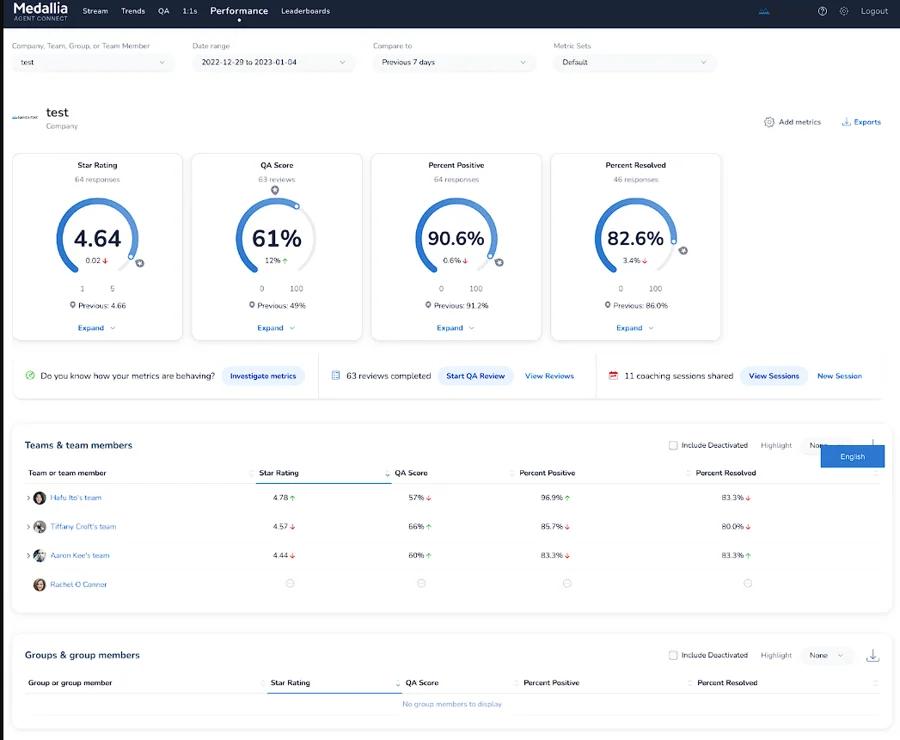
Compared to Viable, Medallia is an older company with extensive experience in customer experience management and comprehensive reporting tools.
However, when compared to its competitors, Medallia has four distinct disadvantages:
- According to users, Medallia's customization features need to be improved.
- Integration with other platforms only sometimes works seamlessly.
- Users find that Medallia's reporting needs to improve regarding visualization capabilities.
- Customer service may only sometimes be sufficiently responsive.
Medallia Reviews
👍 Pros
- Customer Feedback Collection: Medallia gathers customer feedback through various channels such as surveys, emails, social media, customer service representatives, and more.
- Emotional Analysis: It analyzes the emotional tones in user feedback and understands customer sentiments.
- Theme and Topic Modeling: Medallia identifies different themes and topics, allowing you to gain important insights. For example, you can analyze customer opinions grouped around a specific product or service.
- Visualization and Reporting: It presents analysis results to the user in visual graphs and reports, making it easier to understand the data.
- Social Media Analysis: Medallia uses artificial intelligence to analyze customer feedback on social media platforms like Twitter, Pinterest, Reddit, YouTube, etc., allowing companies to take into account feedback from social media.
- Integration: It integrates with many platforms, such as Zendesk, Trustpilot, Qualtrics, Kustomer, and more.
- Automation and Data Analysis: Medallia automates data analysis processes, saving time.
👎 Cons
- Medallia may face integration challenges with other platforms.
- Users mentioned in their reviews that Medallia's report customization feature needs to be improved.
- The user interface may be complex for some users.
- QA functionality is limited compared to other QA platforms.
Medallia Pricing:
You need to contact us for pricing information.
5- Viable vs. SentiSum
SentiSum is a platform focused on analyzing and understanding customer feedback. This platform enables companies to automatically scan customer reviews, social media posts, surveys, and other data sources to identify emotional tones, key themes, and essential insights.
Compared to Viable, SentiSum analyzes customer feedback in natural language, identifying emotional tones and key themes.
SentiSum Reviews
👍 Pros
- CSAT Analytics: SentiSum uses text and sentiment analytics to automate the analysis of CSAT survey results. It links support ticket topics to CSAT scores, so you know why negative scores were given even if the customer didn't leave feedback.
- Support Ticket Analysis: SentiSum allows businesses to analyze every customer interaction in detail by integrating with help desks. You can instantly identify customer issues, generate accurate solutions, and increase customer satisfaction.
- Emotional Analysis Capability: SentiSum analyzes the emotional tones in customer feedback to understand customer emotions.
- Theme and Topic Modeling: The platform identifies themes and topics to gain valuable insights. Especially in feedback with large amounts of data, analyzing and automatically identifying themes and issues makes tasks more manageable.
- Automatic Routing: It routes support calls in real time, saving time.
- Automatic Prioritization: Prioritize notifications automatically based on urgency, risk, and sensitivity, reducing the first response time for essential support tickets.
- Social Media Analysis: SentiSum can analyze topics discussed on social media platforms such as Twitter, Reddit, YouTube, and Pinterest with the help of artificial intelligence. This allows businesses to track feedback coming from social media.
- Integration: SentiSum integrates with many platforms, such as Freshdesk, Intercom, Dixa, Gorgias, SurveyMonkey, and more.
👎 Cons
- Some users find the interface complex.
- There may be limitations with some integrations.
- Improvements could be made in the visual aspects of reports.
- More customization options could be available.
SentiSum Pricing
- Pro: $3,000 VoC analytics for mid-market companies
- Enterprise: VoC analytics + automation for enterprises
6- Viable vs. Wonderflow
Wonderflow is a platform that helps companies improve their products and services by using data from customer feedback. The platform automatically scans companies' customer reviews, social media posts, surveys, etc., to identify emotional tones, key themes, and essential insights.
When comparing Viable and Wonderflow, one disadvantage of Wonderflow is that it only caters to some industries. This can indeed be a limitation.
Wonderflow Reviews
👍 Pros
- Access to Customer Insights: Wonderflow creates a data lake of product and online review data by analyzing Voice of the Customer (VoC) data from buyers and competitors through artificial intelligence.
- Precise Analysis and Predictions: Wonderflow provides precise analysis since customer feedback data is analyzed with artificial intelligence. Additionally, you can predict the impact of product features on business KPIs such as CSAT.
👎 Cons
- Some markets are not captured well, it would be great if we can get customer feedback from niche markets as well.
- Wonderflow’s dashboard looks really old. It needs a better UI.
- Wonderflow’s classification is not that dynamic. Seems like they only have some pre-defined labels with pre-built models. So you’ll need to train a model to analyze your data.
- Their charts and graphs seem old too.
- Looks like it’s focused on the e-commerce market and consumer brands.
Wonderflow Pricing
Unfortunately, there is no pricing information available.








